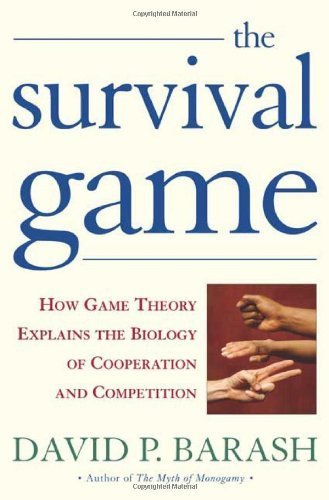
Title

The Survival Game: How Game Theory Explains The Biology Of Human Cooperation And Competition
Delivery time: 8-12 business days (International)
From A Zoologist And Psychologist, An Astonishing Look At The Biological And Strategic Roots Of Human Decisionshumans, Like Bacteria, Woodchucks, Chimpanzees, And Other Animals, Compete Or Cooperate In Order To Get Food, Shelter, Territory, And Other Resources To Survive. But How Do They Decide Whether To Muscle Out Or Team Up With The Competition?In The Survival Game, David P. Barash Synthesizes The Newest Ideas From Psychology, Economics, And Biology To Explore And Explain The Roots Of Human Strategy. Drawing On Game Theorythe Study Of How Individuals Make Decisionshe Explores The Giveandtake Of Spouses In Determining An Evening'S Plans, The Behavior Of Investors In A Market Bubble, And The Maneuvers Of Generals On A Battlefield Alongside The Mating And Fighting Strategies Of Less Rational Animals. Ultimately, Barash'S Lively And Clear Examples Shed Light On What Makes Our Decisions Human, And What We Can Glean From Game Theory And The Natural
By changing our most important processes and
products, we have already made a big leap forward. This ranges from the
increased use of more sustainable fibers to the use of more
environmentally friendly printing processes to the development of
efficient waste management in our value chain.
⚠️ WARNING (California Proposition 65):
This product may contain chemicals known to the State of California to cause cancer, birth defects, or other reproductive harm.
For more information, please visit www.P65Warnings.ca.gov.
Shipping & Returns
Shipping
We ship your order within 2–3 business days for USA deliveries and 5–8 business days for international shipments. Once your package has been dispatched from our warehouse, you'll receive an email confirmation with a tracking number, allowing you to track the status of your delivery.
Returns
To facilitate a smooth return process, a Return Authorization (RA) Number is required for all returns. Returns without a valid RA number will be declined and may incur additional fees. You can request an RA number within 15 days of the original delivery date. For more details, please refer to our Return & Refund Policy page.
Shipping & Returns
Shipping
We ship your order within 2–3 business days for USA deliveries and 5–8 business days for international shipments. Once your package has been dispatched from our warehouse, you'll receive an email confirmation with a tracking number, allowing you to track the status of your delivery.
Returns
To facilitate a smooth return process, a Return Authorization (RA) Number is required for all returns. Returns without a valid RA number will be declined and may incur additional fees. You can request an RA number within 15 days of the original delivery date. For more details, please refer to our Return & Refund Policy page.
Warranty
We provide a 2-year limited warranty, from the date of purchase for all our products.
If you believe you have received a defective product, or are experiencing any problems with your product, please contact us.
This warranty strictly does not cover damages that arose from negligence, misuse, wear and tear, or not in accordance with product instructions (dropping the product, etc.).
Warranty
We provide a 2-year limited warranty, from the date of purchase for all our products.
If you believe you have received a defective product, or are experiencing any problems with your product, please contact us.
This warranty strictly does not cover damages that arose from negligence, misuse, wear and tear, or not in accordance with product instructions (dropping the product, etc.).
Secure Payment
Your payment information is processed securely. We do not store credit card details nor have access to your credit card information.
We accept payments with :
Visa, MasterCard, American Express, Paypal, Shopify Payments, Shop Pay and more.
Secure Payment
Your payment information is processed securely. We do not store credit card details nor have access to your credit card information.
We accept payments with :
Visa, MasterCard, American Express, Paypal, Shopify Payments, Shop Pay and more.
Related Products
You may also like
Frequently Asked Questions
- Q: What is 'The Survival Game' about? A: 'The Survival Game' explores the biological and strategic roots of human cooperation and competition through the lens of game theory, examining how humans make decisions in various scenarios.
- Q: Who is the author of 'The Survival Game'? A: The author of 'The Survival Game' is David P. Barash, who is both a zoologist and psychologist.
- Q: What is the publication date of 'The Survival Game'? A: 'The Survival Game' was published on December 2, 2003.
- Q: What is the binding type of this book? A: 'The Survival Game' is available in a hardcover binding.
- Q: How many pages does 'The Survival Game' have? A: 'The Survival Game' contains 320 pages.
- Q: What condition is the used book in? A: The used book is listed as being in good condition.
- Q: What edition of 'The Survival Game' is available? A: This listing is for the first edition of 'The Survival Game'.
- Q: Does 'The Survival Game' have any illustrations or diagrams? A: The description does not specify any illustrations or diagrams in 'The Survival Game', focusing instead on textual analysis.
- Q: Is 'The Survival Game' suitable for academic study? A: Yes, 'The Survival Game' synthesizes ideas from psychology, economics, and biology, making it a valuable resource for academic study in these fields.
- Q: What themes are explored in 'The Survival Game'? A: 'The Survival Game' explores themes of competition, cooperation, and decision-making in both humans and animals, using game theory as a framework.
